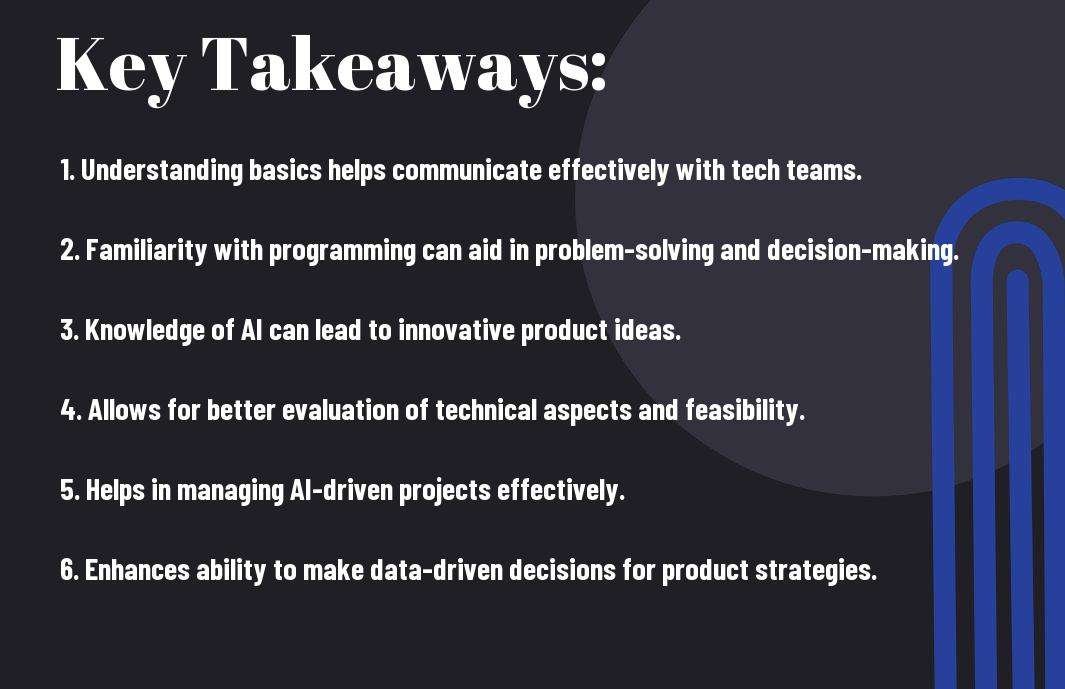With the rapid advancement of artificial intelligence revolutionizing industries, you may wonder if programming knowledge is crucial for product managers today. Understanding the basics of coding can equip you with the skills needed to effectively collaborate with technical teams and make informed decisions about AI-driven products. Let’s research into the importance of programming for product management in this digital era.
Key Takeaways:
- Understanding AI technologies: Product Managers should have a basic understanding of AI technologies to effectively collaborate with AI teams and make informed decisions.
- Communication and collaboration: While programming knowledge is not mandatory, product managers need strong communication and collaboration skills to work effectively with technical teams developing AI-based products.
- Emphasis on data skills: Product Managers should focus on developing strong data analysis skills to leverage AI technologies and make data-driven decisions for product development and improvement.

The Rise of AI in Product Management
The Increasing Demand for Tech-Savvy Product Managers
On the fast-evolving landscape of product management, the demand for tech-savvy product managers is on the rise. As companies increasingly rely on technology to drive innovation and stay competitive, product managers need to possess a deep understanding of AI and its applications. By having a solid grasp of programming languages and AI concepts, you can better collaborate with engineering teams, analyze data trends, and make data-driven decisions to enhance product performance.
How AI is Changing the Product Management Landscape
Rise
It is important to recognize how AI is reshaping the product management landscape. AI algorithms can analyze vast amounts of data in real-time, providing you with valuable insights into consumer behavior and market trends. By leveraging AI tools, you can automate routine tasks, predict user preferences, and optimize product roadmaps for enhanced user experiences.

The Role of Programming Knowledge in Product Management
Now, in the age of artificial intelligence, understanding the role of programming knowledge in product management is crucial. As highlighted in Product Management in the Age of Artificial Intelligence, the landscape of product management is evolving rapidly. Let’s explore into why coding skills are no longer just a nice-to-have but a necessity in this field.
Why Coding Skills are No Longer a Nice-to-Have
Programming has moved from being a skill that sets you apart to one that is increasingly becoming a foundational requirement in product management. Understanding programming languages like Python, R, or Java can significantly enhance your ability to communicate with technical teams, grasp the feasibility of new features, and foresee potential roadblocks in projects. With the rise of AI-powered products, having a basic understanding of coding principles can make a substantial difference in the way you conceptualize, strategize, and deliver innovative solutions as a product manager.
The Benefits of Having a Technical Background
Management in artificial intelligence demands a unique blend of strategic vision and technical acumen. Having a technical background equips you with the ability to bridge the gap between the technical and business aspects of product development. It allows you to speak the language of engineers, data scientists, and designers more fluently, enabling you to translate complex technical concepts into actionable strategies that align with your company’s goals. Across industries where AI is reshaping traditional business models, your technical proficiency can be a competitive advantage in steering product development towards success.
It is important to recognize that even if you do not aim to become a coding expert, a foundational understanding of programming can empower you to make well-informed decisions, lead cross-functional teams effectively, and drive innovation in products that harness the power of artificial intelligence.
The Intersection of AI and Product Management
Keep Unlocking the Power of AI in Product Management in mind as you navigate the ever-evolving landscape of product management in the era of artificial intelligence. The fusion of AI and product management presents both challenges and opportunities that you, as a product professional, must navigate with finesse and insight.
How AI is Augmenting Product Management Tasks
One way AI is transforming product management is by streamlining processes and providing invaluable insights through data analysis. **AI algorithms can process vast amounts of data at incredible speeds, allowing you to make **well-informed decisions quicker than ever before. Additionally, AI-powered tools can **predict trends and **customer behavior, providing you with a competitive edge in the market.
The Importance of Human Judgment in AI-Driven Decision-Making
**Importance** Human judgment remains **critical in AI-driven decision-making processes. While AI can offer data-driven insights, **your experience and intuition as a product manager are invaluable when interpreting results and making strategic decisions. **Understanding the context in which AI recommendations are made is crucial to leveraging AI effectively in your product management role.
**Augmenting** By combining the power of AI with **your human judgment, you can harness the full potential of artificial intelligence to **drive innovation and **success in your product management endeavors.
The Skills Gap in Product Management
Many product managers today face a significant skills gap when it comes to technical knowledge, particularly in programming. While traditional product management skills like market research, product strategy, and project management are crucial, the rise of artificial intelligence and data-driven decision-making necessitates a deeper understanding of technical concepts.
The Current State of Programming Knowledge Among Product Managers
Product managers often find themselves lacking the necessary programming knowledge to effectively collaborate with data scientists and engineers. Understanding algorithms, data structures, and the basics of coding can be imperative when working on AI-driven products. Without this foundational technical knowledge, product managers may struggle to communicate effectively with their technical teams, leading to misunderstandings and delays in product development.
The Consequences of Not Having Technical Expertise
An important consequence of not possessing technical expertise as a product manager is the risk of making decisions based on incomplete or misunderstood information. Without a basic understanding of programming principles, you may find it challenging to assess the feasibility of certain features or to properly prioritize tasks based on technical complexity. This can result in inefficient use of resources, missed opportunities for innovation, and ultimately, product failure.
An awareness of the technical aspects of a product is crucial for a product manager to make informed decisions and effectively lead cross-functional teams. This knowledge not only streamlines communication but also enables you to ask the right questions, anticipate challenges, and drive innovation in a rapidly evolving tech landscape.
Building a Strong Foundation in Programming
Not everyone starts their journey as a Product Manager with a background in programming. However, in today’s tech-driven world, having a basic understanding of coding can greatly benefit you in your role. Building a strong foundation in programming can help you communicate more effectively with your technical team, understand the possibilities and limitations of technology, and make informed decisions when designing products.
Where to Start: Resources for Learning to Code
One great place to start learning to code is online platforms like Codecademy, Udemy, and Coursera, which offer interactive courses in various programming languages. Books like Clean Code: A Handbook of Agile Software Craftsmanship by Robert C. Martin can also provide valuable insights into writing efficient code. Additionally, joining coding communities such as GitHub can help you collaborate with other programmers and enhance your coding skills.
Overcoming the Fear of Coding: Tips for Non-Technical Product Managers
An imperative tip for non-technical Product Managers is to start small and practice regularly to build your coding skills gradually. Don’t be afraid to ask for help from your technical team or seek mentorship from experienced programmers. Breaking down complex problems into smaller, manageable tasks can help you tackle coding challenges more effectively. Perceiving coding as a creative problem-solving tool rather than a daunting technical skill can shift your perspective and boost your confidence in learning to code.
- Start small and practice regularly
- Don’t be afraid to seek help and mentorship
- View coding as a creative problem-solving tool
Real-World Applications of Programming Knowledge
How Product Managers are Using Coding Skills to Drive Innovation
The ability to code can significantly enhance your effectiveness as a product manager. Understanding coding languages allows you to communicate better with your development team, grasp technical limitations, and brainstorm innovative solutions to complex problems. This knowledge empowers you to bridge the gap between technical and non-technical teams, leading to smoother collaboration and more efficient product development processes.
Success Stories: Product Managers Who Code
One inspiring example is the story of Sarah, a product manager in a tech startup. By learning to code, Sarah not only improved her communication with developers but also developed a deep understanding of the technology behind her product. This enabled her to identify opportunities for optimization and lead her team to implement groundbreaking features.
Another benefit of coding skills for product managers is the ability to prototype ideas quickly and test hypotheses without heavy reliance on engineering resources. Imagine being able to build a simple version of your product idea in a matter of days, gather user feedback, and iterate rapidly. This agility can give you a competitive edge in the fast-paced world of product development.
Conclusion
To wrap up, in the age of artificial intelligence, having programming knowledge as a product manager can be a powerful tool in your arsenal. While not absolutely crucial, being able to understand the basics of coding can enhance your ability to work effectively with technical teams, analyze data, and make informed decisions. It can also help you better grasp the potential of AI technologies and how they can be leveraged to drive innovation and growth in your products and organization.
So, if you are a product manager looking to stay competitive and relevant in today’s technology-driven world, expanding your knowledge of programming could be a valuable investment. Whether through formal education, online courses, or simply taking the time to learn on your own, acquiring programming skills can open up new opportunities for you to excel in your role and lead your team towards success in the dynamic landscape of AI.
Q: Is programming knowledge imperative for product managers in the age of artificial intelligence?
A: While programming knowledge is not always required for product managers, having a basic understanding of programming concepts can be beneficial, especially in the age of artificial intelligence. It can help product managers communicate effectively with technical teams, make informed decisions, and understand the capabilities and limitations of AI technologies.
Q: What are some programming languages that product managers should consider learning?
A: Product managers interested in learning programming languages relevant to AI should consider languages like Python, R, and Java. Python, in particular, is widely used in AI development due to its simplicity, readability, and extensive libraries for machine learning and data analysis.
Q: How can product managers without programming knowledge leverage AI technologies in their products?
A: Product managers without programming knowledge can leverage AI technologies in their products by collaborating closely with technical teams, staying informed about the latest AI trends and tools, and understanding the impact of AI on their industry. They can also use AI-powered tools and platforms to analyze data, automate tasks, and improve user experiences without needing to write code.







